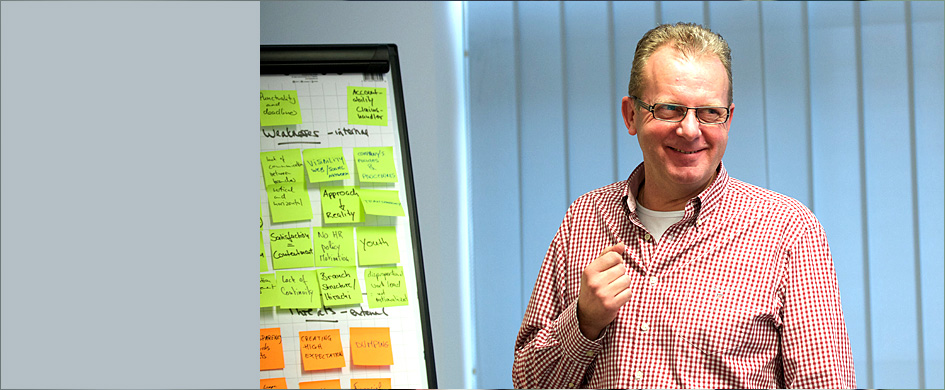Meeting Solvency II Requirements
InterEurope AG will also be indirectly subject to Solvency II regulations no later than from the Solvency II start date on 1 January 2016. As our clients have to meet the Solvency II requirements and InterEurope AG, as a service provider, hence automatically becomes part of the governance system for insurance companies, this range of topics has also gained central importance for us.
As the European regulatory body, the European Insurance and Occupational Pension Authority (EIOPA) has issued guidelines for preparing to meet the requirements of Solvency II. InterEurope AG consulted these guidelines where they were applicable in order to prepare for these future checks by its clients, the insurance companies.
The new regulatory system Solvency II is broadly subdivided into three pillars. The first pillar of Solvency II primarily covers the quantitative regulations. The capital requirements and capital adequacy regulations are set out in addition to provisions for assessing financial assets and liabilities. The second pillar of Solvency II covers qualitative requirements of the governance system, i.e. of the company’s business organisation. The third pillar of Solvency II primarily covers the reporting commitments of companies vis-à-vis the regulatory body and the public.
Pillar II: Governance provisions
Corporate governance
- As a public limited company according to German law, InterEurope AG has a dual administrative body with a separate supervisory board and executive board. There are no overlaps in personnel between these two bodies.
- The supervisory board appoints and monitors the executive board, decides over its remuneration, advises it and decides over business transactions that exceed defined thresholds.
- The supervisory board meets at least four times per year and discusses strategy and the current business situation with the executive board.
- The executive board comprises two members with clearly distinct responsibilities.
- Decisions and resolutions by the executive board and the supervisory board are made and recorded in writing.
- InterEurope AG has a written charter which governs the purpose of the firm, the framework of representation and the authorised signatories.
- InterEurope comprises a centralised organisational structure with proprietary branches in 11 countries.
- Key functions such as compliance, risk management, finance, cash-flow management, personnel, IT, quality and processes are centrally managed across the Group and are subject to clear responsibilities within the executive board.
- The responsibilities and authorisations for financial transactions and in the operational business of claims settlement are regulated in written briefings as part of process descriptions.
- Decisions at the executive board level must be made and signed by at least two members of the executive board.
- The governance system is analysed and evaluated on a yearly basis by the supervisory board in collaboration with the auditor (PWC).
- InterEurope has contingency plans with respect to:
- an IT outage
- capacity bottlenecks induced by staff
- dependency on individual clients
- liquidity bottlenecks or equity requirements
Qualification of the management and supervisory body
All two members of the executive board have university qualifications which relate to their respective core area of responsibility:
- Chair of the executive board – lawyer
- Chief financial officer – graduated in business (Dipl. Kaufmann)
The three members of the supervisory board have the following qualifications:
- Lawyer and executive VP at one of the largest insurance companies in Europe
- Lawyer and former chair of the executive board at a M-DAX company
- MBA and former chair of the executive board at an international IT service provider
Management staff of the operating units have received academic training, mainly in law and economics.
Most employees of claims settlement have undergone legal training.
All employees receive an internal induction before they begin their operational roles.
All employees receive regular training in order to familiarise them with the latest changes in law.
Risk management
- The chief financial officer is responsible for risk management.
- The risks are continuously monitored by the chief financial officer and the risk management system is evaluated by the supervisory board and the auditor on a yearly basis.
- Profit and loss calculation, the balance sheet and cash-flow calculation cover the current and subsequent financial year.
- The monthly reporting and controlling of important indices reduces the risk of negative surprises.
- A successful staff loyalty policy keeps fluctuations in personnel low and reduces the risk of losing expertise.
- Clearly defined responsibilities and competencies in conjunction with the dual-control principle reduce the danger of misuse and fraud.
- Compliance with sanctions lists is ensured through PWC.
- Extremely secure IT platforms protect our clients’ data.
Pillar I: Quantitative regulations
Reserve setting
- For our clients in insurance, correct reserve setting is a central consideration of Pillar I of Solvency II (Quantitative Regulations). Due to the fact that defining reserves for foreign claims is essentially influenced by the respective service provider, InterEurope AG attaches great importance to setting a reserve correctly and in good time. Reserves are set by our most experienced staff in accordance with defined process steps, particularly for personal injuries and high-volume property damages. In the case of personal injuries, we collaborate with a network of experts who actively gather and assess the information. In so doing, we draw from experience with healing processes and tables typical for the country or case-law. The reserves are regularly monitored with injury/healing progress and adapted accordingly. Any change to the reserve is promptly communicated to the client, provided they do not already have access to an automatic interface with InterEurope AG’s system.
Pillar III: Reporting commitments
Reporting to clients
- Extensive and precise management of information (reserves, payments, status quo etc.)
- Internal and external checks to ensure quality (by auditor)
- Quality audits by clients
- Transparency – electronic access to documents, interfaces to clients
Locations

Head Office
InterEurope AG
European Law Service
Hansaallee 249
40549 Düsseldorf
Germany
Find an Office in your country
